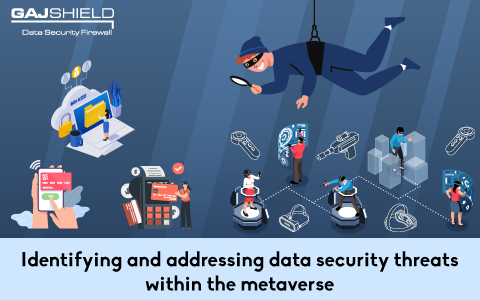Identifying and addressing data security threats within the metaverse
The metaverse is the hot property today and is expected to supplant the internet for good in the future. Therefore, it is hardly surprising that giant corporations, such as Microsoft, Meta, Google, Walmart, Amazon, Disney, and most others one can think of, are laying foundations and setting up their operations and services in the virtual realm. Such companies and the general public excited to shop or game in the metaverse are understandably buoyant about the concept of an immersive, three-dimensional internet, so much so, that all these parties may tend to overlook the data security risks also present there.

So, what kind of data security issues can users face in the metaverse?
Data security threats present in the metaverse
Currently, the metaverse is still in a nascent stage — we can draw parallels between where it is now and where the internet was in the early 90s. Even then, the threat of personal privacy and identity theft are obvious data security issues apparent in the metaverse. If a list had to be made regarding the data security risks present in the metaverse, it would contain some of the following entries:
Personal privacy risks
Even though Meta does not own the metaverse, it is the name that people may tend to associate most with the metaverse. For several years now, Facebook and other social media sites have been associated with mining user data for targeted advertising and other purposes, which means that personal data privacy issues, issues borne out of collecting data in a non-consensual manner, are definitely a problem that may plague users in the metaverse too. Several aspects of the metaverse will be based on selling virtual goods and NFTs, so data collection of individuals will be highly prevalent in the metaverse. Such rampant data collection is harmful to the privacy of metaverse users in the present and the future.
Lack of regulations regarding data collection
The current lack of regulations — laws such as GDPR are not fully fleshed out for the metaverse — within the metaverse may be problematic for all kinds of users, those who are excited about the metaverse as well as those who are reluctant to do so. This lack of regulations can be problematic as there wouldn’t be any parameters for businesses in the metaverse to follow regarding data collection. As a result, companies would collect sensitive information such as NFT data from users, and cryptocurrency transactions would be the norm, with the threat of data leaks or misuse of information always a possibility.
Possible identity theft
As you may know, users enter into the metaverse and interact with others in the form of specially created digital avatars. While this helps them maintain a virtual presence in the metaverse, the digital avatar can also be something that hackers and other malicious elements can illegally access and make virtual transactions or give authorization under the user’s name.
Possible solutions to data security threats in the metaverse
As stated earlier, the metaverse is still at a very early stage of its development. So, data security tools specifically created for the metaverse are still undergoing development and are in a conceptual stage. Therefore, even before data security issues like the ones specified above are identified, policies and frameworks must be designed to deal with them, mitigate their impact, and prevent major issues. Here are some measures that could be taken for quickfire identification and addressing of potential data security threats in the metaverse:
Ensuring that user authentication is stronger
As stated above, account takeovers and identity thefts can seriously mar the experience of users in the metaverse. To protect metaverse netizens from such threats, there must be contextual authentication verification. Builders of the metaverse must create authentication methods that cannot be stolen or even shared from one consumer to another. The relentless level of authentication will ensure that fraudsters and hackers in the metaverse cannot carry out privacy data pilferage. This will also ensure that the account information of a given account stays with its rightful owner. What's more, the use of biometrics to ensure coherent identity authentication makes appropriating someone's identity difficult for hackers. In biometrics, having a user's face or voice for authentication while they enter the metaverse can protect their virtual self from cyber-threats and data privacy threats too. Overall, increasing the authentication strength helps to maintain strong security for users.
Making transactions safer for users
The metaverse already uses blockchain and NFTs for transactions. Now, while blockchain-based systems are fairly secure for data storage, financial authorities in the metaverse can enhance the safety quotient by monitoring every transaction using machine learning algorithms to detect if there’s even a slight instance of fraud or malicious activity in play in such exchanges online. While continuous monitoring is positive, the authorities must also make sure that user privacy is respected. For this, laws such as GDPR must get their metaverse-equivalent counterpart so that data collection and usage are streamlined and safe for users.
Technology is evolving. Therefore, it is safe to expect that metaverse-ready data security tools will keep getting stronger, more robust, and more reliable as time goes on. However, as you have seen, to improve the data security aspect of the metaverse, effective policies must come into play just as much as the technology side of things.
To truly optimize your existing data security infrastructure, your business needs to select Gajshield's highly efficient tools and applications that will boost threat detection and the performance of your digital operations.
Kindly contact us to know more about our cloud security tools, intelligent firewalls, and many other data security solutions tailor-made for your organization.
Get In Touch With Us
Subscribe to our Newsletter
2025 © GajShield Infotech (I) Pvt. Ltd. All rights reserved.
